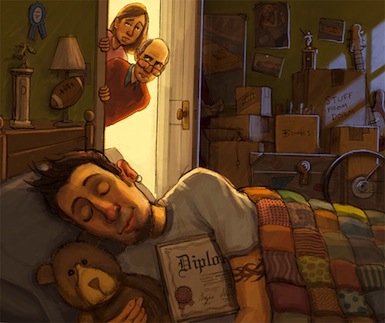In the mid-1950s, during my first year out of college, I was a social caseworker. Like most of my colleagues, I had a variety of cases, including single mothers and their children, blind and disabled people, and individuals on old age assistance. One of the most memorable lessons in my life came from one elderly client.
When I visited the couple’s walk-up tenement apartment for the first time and the man let me in, I saw his wife moving back and forth in her rocking chair and sobbing uncontrollably. The man asked me to step into the hall, where he proceeded to explain why she was so sad. Not only was she dying of cancer, but on that particular day, her birthday, her grandchildren would not be visiting her. Their father, the couple’s only son, would not let them visit then or at any other time.
The man shared a number of other details. He had been a well-to-do hotel owner and had given his son anything he wanted, including one new car after another, and lots of spending money. He also had put the son through college and law school. Now that the son had a successful law practice, owned a lucrative hardware business, and lived in an upscale suburb, he had cut all ties with his parents. Their only income was from welfare.
The man ended the story by asking if I had children. I said I did not. He then implored me:
If you ever have children, please learn from my experience. Don’t spoil them as I did my son. Doing so will ruin their lives and break your heart.
Wise advice, and when I had children, I did my best to follow it.
But such wisdom was swept away in the 1960s, when new ideas gained dominance and changed every aspect of American culture, including family life. Strict parenting gave way to permissiveness and indulgence. Many parents, intent on sparing their children the hardships they had experienced, gave them too much and expected little, if anything, in return. Disobedience and disrespect toward parents and other authority figures was tolerated and even encouraged. The notion that young people knew better than their parents was widely embraced. Self-esteem became more important than achievement. And belief in earning one’s way was replaced with a sense of entitlement.
When young adults failed in college or the job market—as increasingly happened because of their attitudes toward learning and work—parents allowed them to move back home. “What can we do?” the parents said. “He/she is our own flesh and blood? We can’t just abandon our child in time of need.” (Such arguments, eminently reasonable in the case of serious or terminal illness, are empty rationalizations where the only affliction is sloth.) Consider the case of the 22-year-old college graduate who got fired from his first job, was allowed to return home “until he found work” and is still there and still “looking” at age 48! The case may not be typical, but I suspect it is more common than most people imagine.
The trend has grown stronger in recent decades. A Pew Research study reveals that today 53% of adults ages 18-24 and 29% of those ages 25-34 live at home. Also, according to the Maryland Population Center, the number of young American adults living at home and still financially dependent on their parents rose from 20% in 1960 to 46% in 2000. Note that last percentage and date. It puts the lie to the notion that the “boomerang kids” phenomenon was caused by the 2008 recession. Though it certainly made matters worse, the recession did not cause the problem. The cause was and remains the lamentable change in parenting that occurred in the 1960s.
Many analysts are warning of the disastrous world-wide consequences that could result from having so many able people contributing little or nothing to the nation, consequences already manifest in some European countries, notably Greece. Which makes me believe that, if he were alive today, the elderly man who shared his hard-won insight with me so long ago would revise it slightly:
Spoiling children ruins their lives, breaks our hearts, and endangers the world.
Copyright © 2012 by Vincent Ryan Ruggiero. All rights reserved








